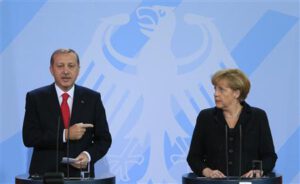German Chancellor Angela Merkel told Turkish Prime Minister Tayyip Erdogan on Wednesday the European Union (EU) would pursue accession talks with his country in good faith, despite some persistent disagreements.
 Erdogan said on Tuesday the EU would lose Turkey if it did not grant it membership by 2023, the first time he has indicated how long Ankara might continue down the path towards EU entry.
Erdogan said on Tuesday the EU would lose Turkey if it did not grant it membership by 2023, the first time he has indicated how long Ankara might continue down the path towards EU entry.
Turkey’s talks to join the bloc, launched in 2005, have all but ground to a halt due to an intractable dispute over the divided island of Cyprus, an EU member, and opposition from core EU members France and Germany.
But Merkel told a joint news conference with Erdogan after talks in Berlin: “The EU is an honest negotiating partner.”
“These negotiations will continue irrespective of the questions that we have to clarify,” she said, referring to criticisms of Turkey in the European Commission’s report on its performance as a candidate country.
Merkel’s centre-right Christian Democratic Party (CDU) is opposed to Turkey, a mainly Muslim but secular country, joining the European Union and instead favors a ‘privileged partnership’ that would fall short of full membership.
“The question of full membership for Turkey is seen within my party in a certain way… We (Germany and Turkey) have learned to live with this difference and still to have good relations,” she added.
Germany is Turkey’s largest trade partner in the 27-nation EU and is also home to some three million Turks, the largest Turkish diaspora in Europe.
Erdogan, in Berlin to open a new Turkish embassy building, said Merkel would visit Turkey next year.
Erdogan took a swipe at Cyprus, which currently holds the EU’s rotating presidency, saying it should not have been allowed to join the bloc in 2004 because it was – and remains – split between an internationally recognized Greek Cypriot south and a northern Turkish Cypriot state recognized only by Ankara.
Erdogan said Merkel had told him in the past she also believed it had been a mistake to admit a divided Cyprus.
“This was a serious mistake and the mistake continues with increasing effects,” Erdogan added.
PROTEST
Turkey has completed only one of 35 policy ‘chapters’ every accession candidate must conclude.
All but 13 policy chapters in Ankara’s negotiations are blocked because of the Cyprus issue and the European Commission, the EU’s executive arm, says Turkey does not yet meet required standards on human rights and freedom of speech.
Turkey’s European Affairs Minister Egemen Bagis told a seminar in Berlin earlier on Wednesday that the situation of human rights and religious and political freedoms had greatly improved since Erdogan’s AK Party took power 10 years ago.
Bagis cited Kurdish language broadcasts and the restitution of property to religious minorities as examples of what he called “a much more democratic, transparent” Turkey, adding that Ankara could not accept a “privileged partnership” with the EU.
“Either you are a member or you are not, there can be no half-way house,” he said.
About 1,000 people protested against Erdogan’s visit in front of the Brandenburg Gate in central Berlin. Some carried red flags or placards that read ‘Dictator Erdogan’, ‘Erdogan oppresses minorities’ and ‘Freedom for the media’.
“We have to protest against Erdogan because journalists, Alevis and others are sitting in prison in Turkey today,” said Natalie Dogan, 50, a housewife from Hamburg, referring a religious minority. “Turkey wants to join the European Union but it is absolutely not ready to do so because it tramples on people’s freedoms.”
In its latest progress report, the European Commission accused Turkey of infringing citizens’ rights to liberty, security, fair trial and freedom of expression and assembly.
Almost 100 journalists are in prison in Turkey as well as thousands of activists, lawyers, politicians, military officers and others. Most are accused of plots against the government or support for outlawed Kurdish militants.
(Reuters)















